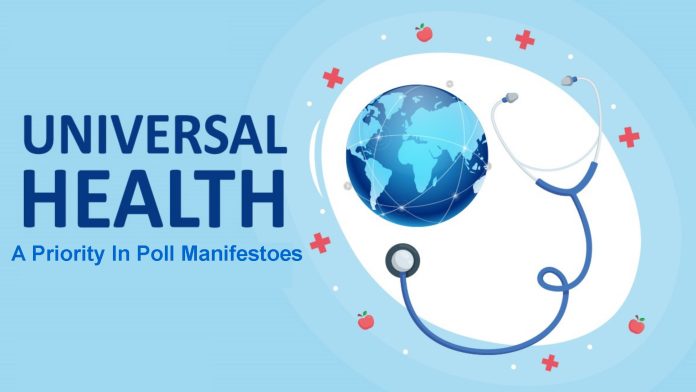Dr Arun Mitra
With the elections process already on, health is serious issue to be taken up by the political parties. Health has been an issue of serious concern to the people because as per government’s own admission over 6 crore people are pushed to poverty because of out of pocket expenditure on health. The health activists have been demanding from the state to own its responsibility to ensure health for all. It is therefore important that the political parties give priority to the concept of universal healthcare in their agenda so that health needs of each citizen are fulfilled without any discrepancy based on religion, caste, creed, gender or economic status. It is therefore pertinent that the government has to directly intervene in making policies which fulfil people’s needs for health. The political parties should commit to make health as a fundamental right and promise to increase the spending on the healthcare to 6% of the GDP.
The right to health is a fundamental human right recognized by the World Health Organization (WHO). It is defined as “a state of complete physical, mental and social well-being and not merely the absence of disease or infirmity”. The right to health extends beyond healthcare to the underlying determinants of health, such as access to potable water, sanitation, adequate food, nutrition and housing, healthy occupational and environmental conditions, and access to health-related education and information. The right to health is inseparable from other human rights, such as the right to food, housing, work, education, information, and participation. Everyone should have access to the health services they need, when and where they need them, without suffering financial hardship.
It is to fulfil this that the world body took initiative to hold an international meet at Almaty in Kazakhstan in 1978. The conference came up with a declaration on health popularly known as Alma Ata Declaration. This declaration pointed out that the existing gross inequality in the health status of the people, particularly between developed and developing countries as well as rich and the poor within countries, is politically, socially, and economically unacceptable. The conference realised that a considerable part of world’s resources is now spent on armaments and military conflicts. A genuine policy of independence, peace, détente, and disarmament could and should release additional resources that could well be devoted to peaceful aims and in particular to the acceleration of social and economic development of which primary health care, as an essential part, should be allotted its proper share.
Since India is signatory to this declaration our Government is duty bound to take steps to ensure universal healthcare. But even today health scenario in our country is far from satisfactory. The basic determinants of health are still not in the reach of all the citizens. There is lack of health education as a result of which large number of population is still using non evidence based and even mythical healthcare means. Both communicable and non-communicable diseases are increasing in the country.
Whatever the government may claim we failed to prevent several thousand deaths because of mismanagement and skewed priorities during the COVID pandemic. Thousands of people had to walk down to their native places without any support for food, shelter and transport by the government. This put them under severe physical and mental health risks.
The Health Care System around the world can be divided in 5 major categories: Universal government funded health system; Universal public insurance system; Universal public-private insurance system; Universal private health insurance system; Non-universal insurance system.
In the framework of Universal government-funded health systems, also recognized as single-payer healthcare, government-funded healthcare extends to all citizens, irrespective of their income or employment status. This system has shown good results as we can see in the UK, Canada, Cuba and several other countries. The insurance based health care has betrayed people’s aspirations on two counts. One, this is a premium based system and any expenses beyond the premium are to be paid by the insurer. Second point is that under this the basic concept of health as a society’s responsibility is belittled as it is the corporate companies who own the insurance system. Even if the health insurance is paid by the government in some cases, it is the corporate insurance companies that stand to gain from the public exchequer. It has also been observed that the senior citizens suffer the most at the hands of these companies.
Passing of Right to Health Bill by the Rajasthan Assembly has been a long overdue requirement of the citizens and demand of the health care organizations. —(IPA)


